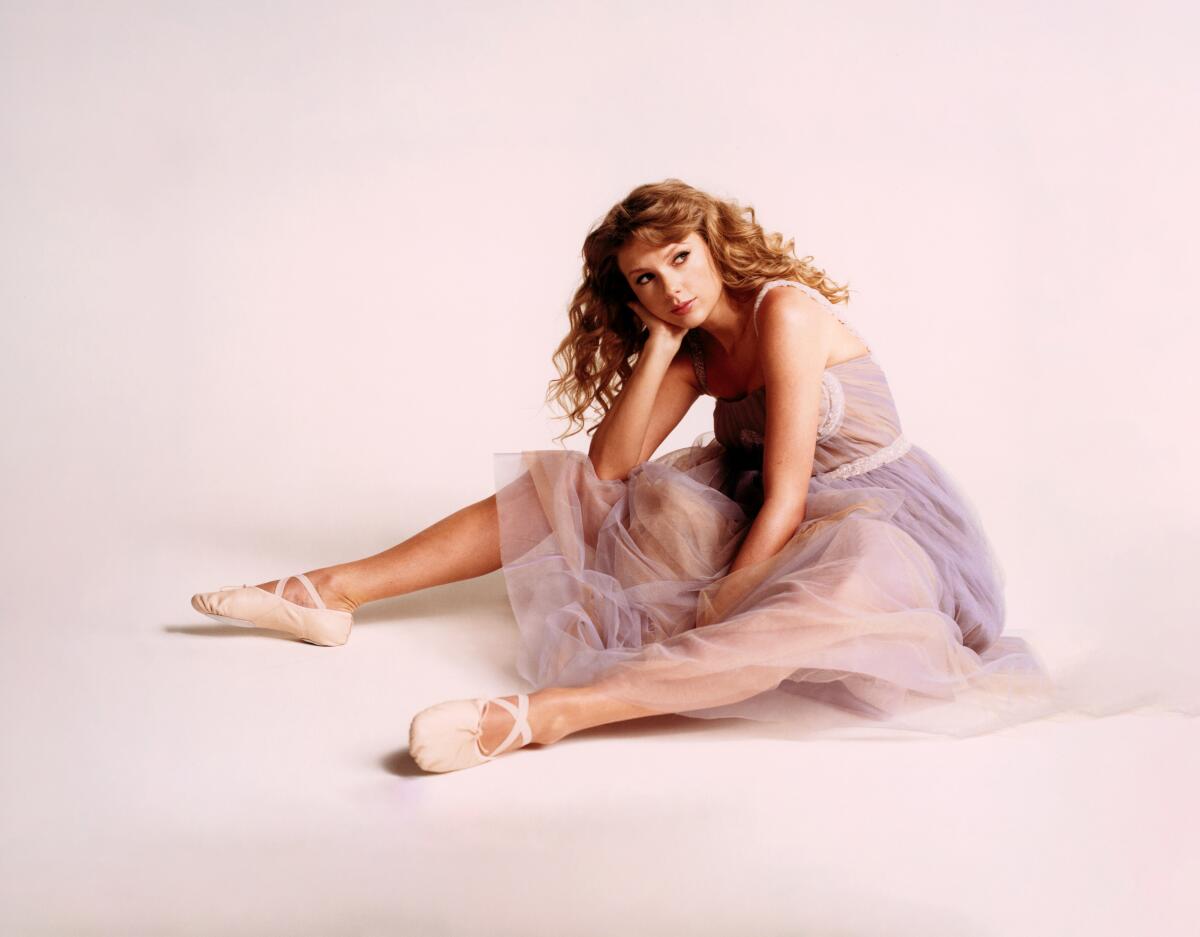A user’s guide to Taylor Swift’s ‘Speak Now (Taylor’s Version)’

- Share via
“Speak Now” wasn’t the album that made Taylor Swift a superstar. But it was the first one she made as a superstar.
Two years after she released “Fearless,” which sold more than 10 million copies and won the Grammy Award for album of the year, Swift returned in 2010 with her third studio LP, a dense and sprawling collection of songs about a life — a creative life, a professional life and a romantic life — lived squarely in the spotlight.
Now, amid the blockbuster Eras Tour she’ll bring to Inglewood’s SoFi Stadium next month for half a dozen nights, Swift, 33, has remade “Speak Now” as the latest installment in her plan to rerecord her first six albums.
Here are five takeaways from “Speak Now (Taylor’s Version)”:

1. SHE WROTE ’EM ALL
Swift has long been proud of the fact that she wrote all 14 songs on “Speak Now” by herself, and that hasn’t changed in 2023. In an essay that accompanies the LP’s new edition, she writes that, having had her authorship questioned in the past, she “made a decision that would completely define this album: I decided I would write it entirely on my own. I figured, they couldn’t give all the credit to my cowriters if there weren’t any. But that posed a new challenge: It really had to be good. If it wasn’t, I would be proving my critics right.”
Some no doubt remained suspicious that a woman in her late teens had truly composed “Speak Now’s” songs. Yet revisiting the album makes clear she accomplished what she set out to do: Her best songs here represent a high point in her immense catalog, with an emotional and intellectual incisiveness she’s never surpassed.
“You made a rebel of a careless man’s careful daughter,” she sings in the strummy opener, “Mine” — an entire short story in a single lyric. “You held your head like a hero on a history-book page,” she sings in the stately closer, “Long Live” — an image about as vivid as words can convey.

2. SHE RETCONNED A SNIDE LYRIC
Though she’s made a virtue of precisely replicating her old albums — the “Taylor’s Version” campaign began, don’t forget, as a way to devalue master recordings she doesn’t own — Swift makes a crucial change in her fresh take on “Better Than Revenge.”
The pop-punk song is a snide takedown of a girl who “steals” the narrator’s boyfriend — a framing that reflects Swift’s mindset at age 19 but that also reveals the institutionalized misogyny in which that mindset was shaped. “She’s not a saint and she’s not what you think / She’s an actress,” Swift sneers in the original. “She’s better known for the things that she does on the mattress.”
On the new “Speak Now,” she swaps out the second of those lines for a less problematic lyric: “He was a moth to the flame / She was holding the matches.” It’s easy to understand why, of course, particularly given the heat Swift faced this year for her evidently short-lived romance with the 1975’s Matty Healy, whose history of demeaning comments regarding women of color led many a Swiftie to question the singer’s professed commitment to a variety of progressive ideals.
But it’s also easy to find some trouble in this attempt by one of the world’s richest and most powerful artists to memory-hole an unflattering moment from her past. What might she retcon next?
With a new album and tour in front of him, and a hardscrabble past and high-profile relationship behind him, musician-actor Dominic Fike is ready for a fresh start.
3. ‘DEAR JOHN’ REMAINS FANTASTICALLY SAVAGE

A better strategy for recontextualizing old work might be the one Swift deployed during a concert last month in Minneapolis, where she introduced a performance of “Speak Now’s” “Dear John” by assuring her ultra-devoted fans that they don’t “need to defend me on the internet against someone you think I might have written a song about 14 billion years ago.”
Her comments were widely understood to refer to John Mayer, about whom Swift is thought to have written “Dear John,” in which she excoriates an ex for gaslighting a woman “too young to be messed with.” Onstage she insisted she no longer cares about what happened to her when she was 19, which is almost certainly untrue. (The whole point of the “Taylor’s Version” project — the whole point of Taylor Swift — is that the past is always alive.)
Yet by explicitly positioning “Dear John” as a totem of her youth, Swift gave herself a kind of moral leeway to present the song as is on the new “Speak Now.” And thank goodness for that: Thirteen years after the song’s original release, its exacting savagery — “I’m shining like fireworks over your sad, empty town” — is still a thrill to behold.
4. BANJOS!
Swift wouldn’t score her first No. 1 single on Billboard’s Hot 100 until “We Are Never Ever Getting Back Together,” from 2012’s “Red” — an album for which she consciously adopted the sleek programmed textures of the hitmaking pop producers Max Martin and Shellback.
Given where she’s gone since then, both aesthetically and commercially, it’s fascinating to remember how rooted in hand-played sounds the former country phenom still was on “Speak Now,” which piled on the strings and banjos and acoustic guitars in a year when the Hot 100 was dominated by the likes of Kesha’s “Tik Tok,” Usher’s “OMG,” Katy Perry’s “California Gurls” and Far East Movement’s “Like a G6.”
On Wednesday, Drake became the latest artist to get hit by an object hurled by a fan at a concert. Should we blame the pandemic? Social media? Lazy bouncers?
5. ‘TIMELESS’ LEADS THE OUTTAKES
Like Swift’s remakes of “Fearless” and “Red” before it, “Speak Now (Taylor’s Version)” comes with a handful of newly recorded outtakes from her so-called vault. None quite rise to the level of what’s on the album itself, though each provides an intriguing look at where her head was as she was writing.
“Electric Touch” has chugging emo guitars provided in part by Fall Out Boy; “I Can See You” sounds like the Police, of all things. “Castles Crumbling” features Hayley Williams of Paramore (one of Swift’s opening acts on the Eras Tour) and, as produced by Swift and Jack Antonoff, suggests she was into cloistered indie folk years before “Folklore” and “Evermore.”
The best of the vault tracks is “Timeless,” a characteristically detailed fantasy in which the narrator, having come across a box of photos in an antique shop, imagines herself in a series of historical romances. (Fans have decided the tune was inspired by Swift’s grandmother Marjorie, whose name provided the title of a track on “Evermore.”) “Time breaks down your mind and body / Don’t you let it touch your soul,” she sings in the bridge — advice she’s clearly taken to heart.
More to Read
The biggest entertainment stories
Get our big stories about Hollywood, film, television, music, arts, culture and more right in your inbox as soon as they publish.
You may occasionally receive promotional content from the Los Angeles Times.













